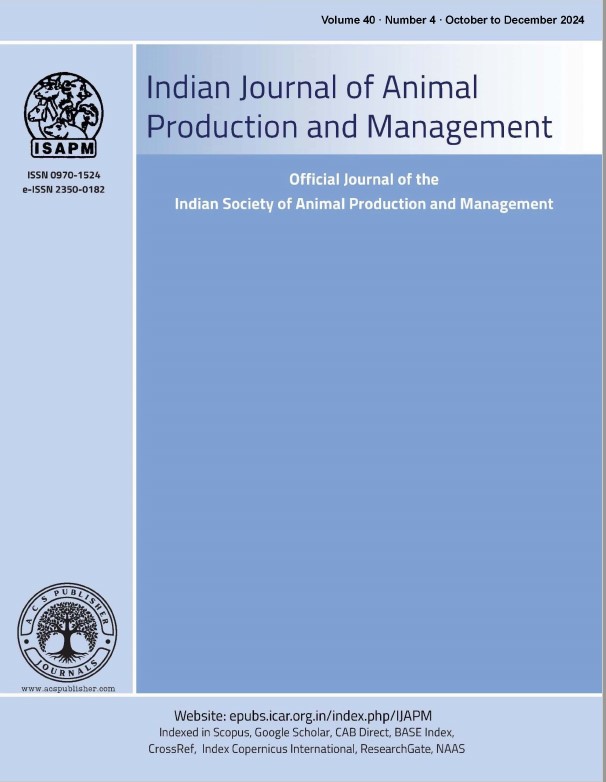Feeding practices of crossbred cattle adopted by dairy farmers in Pathardi Tehsil of Ahmednagar district
DOI:
https://doi.org/10.48165/ijapm.2022.38.1and4.10Keywords:
Crossbred, Dry matter, FeedingAbstract
This investigation was undertaken to study feeding practices of crossbred cattle adopted in Pathardi Tehsil of Ahmednagar district in Maharashtra, India. Total of 150 crossbred cattle owners were chosen randomly as respondents from the ten randomly selected villages. The data was collected through pretested questionnaire. The respondents were distributed in three groups on the basis of crossbred cattle possessed by them; group-I less than 5 crossbred cattle, group-II 6 to 10 crossbred cattle and group-III more than 11 crossbred cattle. Maximum quantity of concentrate, green roughages and dry roughages was fed in group- III as 2.34, 13.80 and 6.54 kg/day, respectively, whereas, minimum quantity was fed in group- I as 1.72, 12.90 and 5.81 kg/day, respectively. Maximum (11.28 kg/day) dry matter was fed in group- III and minimum (9.85 kg/day) was fed in group- I. The average concentrate to roughage ratio (on DM basis) was 15.48 : 84.46, 17.55 : 82.44 and 18.56 : 81.42, in group I, group II and group III, respectively. The average digestible crude protein and total digestible nutrient intake of crossbred cattle were 0.519, 0.585 and 0.629 kg/day and 5.44, 5.99 and 6.39 kg/day in group I, group II and group III, respectively. The average DCP and TDN intake were 91.65, 97.12 and 93.20 percent of requirement and 103.4, 107.76 and 103.54 percent of requirement in group I, group II and group III, respectively. DCP intake was deficient by 5.91, 2.87 and 6.79 percent however, TDN intake was surplus by 3.39, 6.64 and 3.54 percent in group I, group II and group III, respectively. Feeding of green roughages, dry roughages and concentrates was positively and highly significantly correlated with milk production in all the groups. Major constraints observed were only 18.66 percent farmers provided their animals with mineral mixture, however, 95.33 percent farmers fed common salt to their animals. Processing of concentrates before feeding was done by 23.33 percent farmers. Techniques like enrichment of poor quality roughages with urea and ammonia were adopted by only 16.66 percent farmers.

